Feb 14, 2023 | Non categorizzato
Loving each other in marriage is a great challenge. It means getting lost in each other’s paths, sharing life, sowing patiently and reaping the fruits; it means choosing each other every day even when we do not recognize each other, if necessary, learning to slow down to keep up with each other. On the day of lovers, we share the story told at the November 2017 “Collegamento” by Giulio and Pina Ciarrocchi. 22 years earlier, in May 1995, following the arrival of a stroke that changed their lives, they found the courage to let God guide them, experiencing a new way to fall in love again every day, seeing Jesus in each other. https://www.youtube.com/watch?v=ZM6vJUrUqX8&list=PL9YsVtizqrYt2S6qrtBBS1Xu_B3p-juwd&index=1
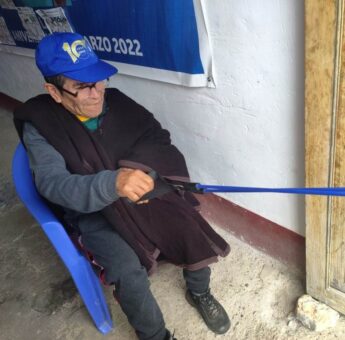
Feb 11, 2023 | Non categorizzato
The mission of the “Chiara Lubich” Hogarcito, the Centre for the Elderly in the Peruvian Amazon forest, is to accompany the elderly and the ill. A place where service is motivated by love, where there are people who do good, able to put everything in God’s hands. Halfway through last year a woman came to the Hogarcito to ask for help. She urgently needed support for her elderly brother who lived alone, far from the capital where she lived. She asked us to welcome him into the “Hogarcito” and, after asking her to give us some time to explore the situation and our own possibilities, we put ourselves in the shoes of her brother and did not hesitate to welcome him. This is how Feliciano, 74, became a new guest of the Hogarcito. We welcomed him with great affection and with a welcome party. We discovered that he had lost the sight of one eye, that he had speech problems, you could barely understand what he was saying, as well as severe deafness.

Feliciano during rehabilitation
Volunteers of the “Hogarcito”
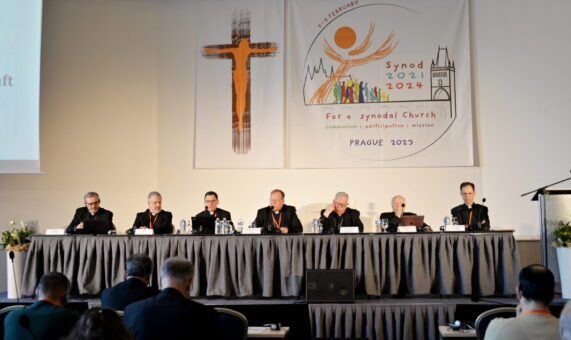
Feb 10, 2023 | Non categorizzato
The primacy of listening, a shared journey open to dialogue and encounter, the challenges of secularization, of lasting peace, of welcoming the many diversities of humanity are at the centre of this phase. Margaret Karram, President of the Focolare is one of the participants at the European Synodal Continental Assembly. “We gather in Prague, a city that can be considered a bridge between East and West, but which also expresses a warning for Europe. Today, just over thirty years after the fall of the Berlin Wall which marked the end of the world divided into opposing blocs, we have another war in the heart of Europe. We feel close to our Ukrainian siblings, in the hope that Russian aggression will end and that true peace and reconciliation will be found on our continent.” 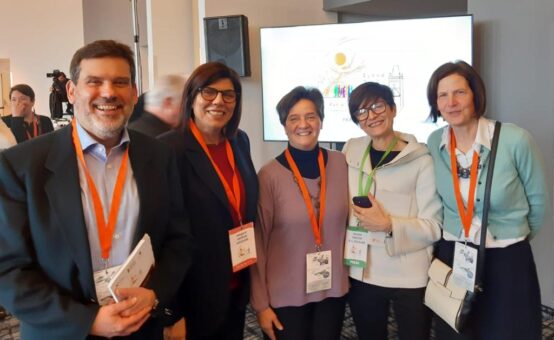 These are the words of Gintaras Grušas, Archbishop of Vilnius (Lithuania), President of the Council of European Episcopal Conferences (CCEE), in his opening speech at the European Synodal Continental Assembly. Solidarity with the Turkish and Syrian populations affected by the terrible earthquake was also expressed immediately. The meeting is taking place in the capital of the Czech Republic, from 5th-12th February, with the participation of 200 delegates from the 39 European Episcopal Conferences, from 45 countries. There were also 44 “guests” including Margaret Karram, President of the Focolare Movement. Cardinal Mario Grech, Secretary General of the Synod, offered a realistic perspective of this phase of the journey saying, “We are all learners in synodality.” The Church in Europe met to experience a journey of sharing, more necessary than ever today, to get to know each other and to break down prejudices.
These are the words of Gintaras Grušas, Archbishop of Vilnius (Lithuania), President of the Council of European Episcopal Conferences (CCEE), in his opening speech at the European Synodal Continental Assembly. Solidarity with the Turkish and Syrian populations affected by the terrible earthquake was also expressed immediately. The meeting is taking place in the capital of the Czech Republic, from 5th-12th February, with the participation of 200 delegates from the 39 European Episcopal Conferences, from 45 countries. There were also 44 “guests” including Margaret Karram, President of the Focolare Movement. Cardinal Mario Grech, Secretary General of the Synod, offered a realistic perspective of this phase of the journey saying, “We are all learners in synodality.” The Church in Europe met to experience a journey of sharing, more necessary than ever today, to get to know each other and to break down prejudices. 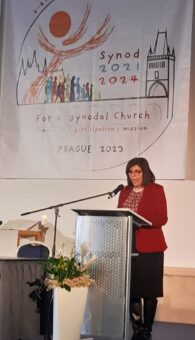 The Voice of the Churches in Europe The sessions dedicated to the experience of the synodal journey of the various Episcopal conferences gave a glimpse into the life of the Churches in Europe. From Albania where today Christians are confronted with the need to learn to dialogue with people of different religions to Belgium, where secularization has reached every social sphere. The invitation is to know how to grasp the signs of the times, giving space to the laity, avoiding every form of clericalism, every yielding to attitudes of abuse and power. In Belarus, the synodal journey brought to light the need for formation in dialogue for both the clergy and the laity in order to have a greater impact on society. Bulgaria, a country with a very small percentage of Catholics, told of a synodal path animated by a strong ecumenical spirit. This was shared by several countries of Eastern Europe, while from France came a resolute invitation to listen, to the centrality of the victims of abuse in the Church and to a path of purification in spiritual life to rediscover fidelity to Christ and to be a welcoming Church for all. The Churches of Great Britain and Wales emphasized the need for ongoing formation in the life of faith and evangelization. Transversal issues
The Voice of the Churches in Europe The sessions dedicated to the experience of the synodal journey of the various Episcopal conferences gave a glimpse into the life of the Churches in Europe. From Albania where today Christians are confronted with the need to learn to dialogue with people of different religions to Belgium, where secularization has reached every social sphere. The invitation is to know how to grasp the signs of the times, giving space to the laity, avoiding every form of clericalism, every yielding to attitudes of abuse and power. In Belarus, the synodal journey brought to light the need for formation in dialogue for both the clergy and the laity in order to have a greater impact on society. Bulgaria, a country with a very small percentage of Catholics, told of a synodal path animated by a strong ecumenical spirit. This was shared by several countries of Eastern Europe, while from France came a resolute invitation to listen, to the centrality of the victims of abuse in the Church and to a path of purification in spiritual life to rediscover fidelity to Christ and to be a welcoming Church for all. The Churches of Great Britain and Wales emphasized the need for ongoing formation in the life of faith and evangelization. Transversal issues  There are many transversal issues for the Churches of the old continent: from the scourge of abuse, to the formation of the clergy so that they regain the trust of the people of God and rise to the challenges of today’s de-Christianized and secularized society, to the question of women in the Church, to the urgency of the transmission of the faith today, but with a language and modality suited to the times. But there is one common question for all: what does it mean for the Church in Europe to be “inclusive”? How can it also embrace those people who live complex moral situations with respect to Church doctrine, such as divorced people or LGBTQ+ people? The answers can only come from a patient journey of communion. In her input, Margaret Karram said, “I believe that the response that the Church in Europe can offer today is the gift of that evangelical love that comes to us from Christ himself and is at the heart of dialogue and encounter. As a Focolare Movement we commit ourselves to this path to which the Pope is calling us.” For the Church in Europe, the synodal days in Prague are a real life experiment in synodality, which highlight the need to continue on this path. The final document, the result of these working days, will include all the requests, challenges and proposals and, together with those of the other 6 continental assemblies, will be sent to the central commission of the Synod.
There are many transversal issues for the Churches of the old continent: from the scourge of abuse, to the formation of the clergy so that they regain the trust of the people of God and rise to the challenges of today’s de-Christianized and secularized society, to the question of women in the Church, to the urgency of the transmission of the faith today, but with a language and modality suited to the times. But there is one common question for all: what does it mean for the Church in Europe to be “inclusive”? How can it also embrace those people who live complex moral situations with respect to Church doctrine, such as divorced people or LGBTQ+ people? The answers can only come from a patient journey of communion. In her input, Margaret Karram said, “I believe that the response that the Church in Europe can offer today is the gift of that evangelical love that comes to us from Christ himself and is at the heart of dialogue and encounter. As a Focolare Movement we commit ourselves to this path to which the Pope is calling us.” For the Church in Europe, the synodal days in Prague are a real life experiment in synodality, which highlight the need to continue on this path. The final document, the result of these working days, will include all the requests, challenges and proposals and, together with those of the other 6 continental assemblies, will be sent to the central commission of the Synod.
Stefania Tanesini
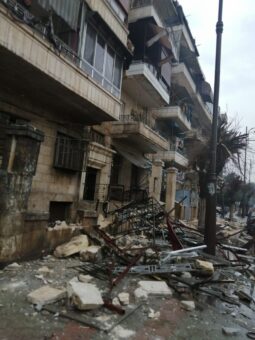
Feb 9, 2023 | Non categorizzato
On 6th February, powerful earthquakes struck southern and central Turkey and Syria. A disaster that has caused the destruction of entire cities. Many people are missing and thousands have died. Here are two eye witness accounts. Umberta Fabris, from the focolare of Istanbul, emotionally described the situation in which Turkey finds itself with this unprecedented disaster which struck Turkey and Syria during the night between 5th-6th February: “On the evening of Sunday 5th February, the authorities announced that the schools would be closed the next day as a violent storm was forecast. Temperatures are near zero and it is the coldest time of the year in Turkey.” The magnitude of this earthquake is unimaginable. Ten provinces of Turkey are affected, 13 million people are involved and violent tremors continue. To date, there are over 14,000 victims, but the numbers continue to increase as the rescue proceeds. Umberta Fabris told us, “Istanbul is about 1,000 kms away from the affected areas but we are surrounded by people who have relatives and friends, who are awaiting news that arrives drop by drop. Mobile phones have run out, there is no electricity and there is enormous damage to all the infrastructures including the communications networks. We receive just a few text messages or manage to exchange a few words with a very disturbed line. We keep trying to get news about people, including our friends in Antioch, Mersin, Adana and Iskenderun”. 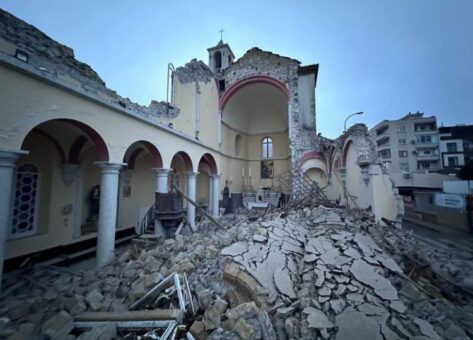 In the catastrophe of the ruins and the cold, suffering brings people together to respond. Umberta heard about the collapse of the Basilica of the Annunciation in Iskenderum and how many houses of the Archdiocese have been declared uninhabitable. Catholics, Orthodox, and Muslims came together to share what they have and to offer accommodation. She said, “It is incredible to see the thousands of young people who have crowded into the airport, ready to go to help with the rescue. There is an endless queue of people to donate blood and secondary school students are getting involved in many projects of assistance. We continue to trust in God and in his Providence and to remember our beloved Syria.” Bassel, a young member of the Focolare in Syria sent us this account, “These are devastating days also in my city, Aleppo. On 6th February we woke up terrified and ran towards the stairs, we couldn’t see anything, due to the power failure. We stopped at the front door, where there is an image of the Guardian Angel and said a prayer. Then we found a mobile phone and switched on the light. I didn’t recognize the room: everything on the floor was broken, the walls and tiles were cracked, the neighbours coming down the stairs screaming. We took only what we could carry in our pyjama pockets, put on our coats and went out in the rain and freezing cold.”
In the catastrophe of the ruins and the cold, suffering brings people together to respond. Umberta heard about the collapse of the Basilica of the Annunciation in Iskenderum and how many houses of the Archdiocese have been declared uninhabitable. Catholics, Orthodox, and Muslims came together to share what they have and to offer accommodation. She said, “It is incredible to see the thousands of young people who have crowded into the airport, ready to go to help with the rescue. There is an endless queue of people to donate blood and secondary school students are getting involved in many projects of assistance. We continue to trust in God and in his Providence and to remember our beloved Syria.” Bassel, a young member of the Focolare in Syria sent us this account, “These are devastating days also in my city, Aleppo. On 6th February we woke up terrified and ran towards the stairs, we couldn’t see anything, due to the power failure. We stopped at the front door, where there is an image of the Guardian Angel and said a prayer. Then we found a mobile phone and switched on the light. I didn’t recognize the room: everything on the floor was broken, the walls and tiles were cracked, the neighbours coming down the stairs screaming. We took only what we could carry in our pyjama pockets, put on our coats and went out in the rain and freezing cold.”  Bassel spent that endless night on the street, watching churches and mosques collapse. The moonlight illuminated the destruction. As the aftershocks became lighter, there were reports of friends trapped under the rubble and whole buildings collapsing. “Our country is not equipped for this kind of disaster. The 7 floor building of the Archdiocese of the Greek-Catholic Melkite Church was one of those that collapsed. Mons. Jean-Clément Jeanbart, emeritus Archbishop of Aleppo, was saved while Father Imad, my personal friend and our teacher at school since I was a child, was trapped under the rubble”. People talk about their homes using the past tense. The cold makes everything more difficult. The Red Crescent and the Red Cross tried to assess how many were saved. Bassel said, “I worked with the volunteers and young scouts to prepare and distribute food and blankets for children and youth, I couldn’t sleep because of the terrifying scenes I had witnessed”. As the aftershocks continue to destroy buildings, Bassel reflected: “When we hear the news, we see the big countries sending experts, aid and relief teams to the affected countries. It is awful for us to see that they cannot send anything to Syria because of the embargo, as if we were not human beings. We have been able to go back home now, where the Internet is better but we are waiting for the next quake. Pray that we will survive, pray for those who have died, pray for those who are missing”. Anna Lisa Innocenti and Maria Grazia Berretta To help or make a donation click here
Bassel spent that endless night on the street, watching churches and mosques collapse. The moonlight illuminated the destruction. As the aftershocks became lighter, there were reports of friends trapped under the rubble and whole buildings collapsing. “Our country is not equipped for this kind of disaster. The 7 floor building of the Archdiocese of the Greek-Catholic Melkite Church was one of those that collapsed. Mons. Jean-Clément Jeanbart, emeritus Archbishop of Aleppo, was saved while Father Imad, my personal friend and our teacher at school since I was a child, was trapped under the rubble”. People talk about their homes using the past tense. The cold makes everything more difficult. The Red Crescent and the Red Cross tried to assess how many were saved. Bassel said, “I worked with the volunteers and young scouts to prepare and distribute food and blankets for children and youth, I couldn’t sleep because of the terrifying scenes I had witnessed”. As the aftershocks continue to destroy buildings, Bassel reflected: “When we hear the news, we see the big countries sending experts, aid and relief teams to the affected countries. It is awful for us to see that they cannot send anything to Syria because of the embargo, as if we were not human beings. We have been able to go back home now, where the Internet is better but we are waiting for the next quake. Pray that we will survive, pray for those who have died, pray for those who are missing”. Anna Lisa Innocenti and Maria Grazia Berretta To help or make a donation click here

Feb 8, 2023 | Non categorizzato
Call from the Politics for Unity Movement – Focolare
 “A heartfelt and strong call for an immediate end to the embargo in Syria that makes it difficult even to get aid through at this terrible time”. This is addressed by the International Center of the Politics for Unity Movement, an expression of the Focolare Movement, to the international community, governments and the European Union. “At least temporarily suspend the financial embargo in order to promptly allow the humanitarian organizations already active on the ground to provide the necessary aid”. Dramatic news is also arriving from communities and families in the earthquake-hit areas. The Focolare Movement, which has already been working in Syria for years with humanitarian aid and projects, has taken action with a special worldwide fundraiser. However, the difficulty of getting aid to Syria remains due to the measures introduced with the financial embargo. The Politics for Unity Movement is also activating all possible channels of contact with other Movements and Associations and with those who have decision-making power and political persuasion, “but let’s do it quickly, to save as many people as possible”.
“A heartfelt and strong call for an immediate end to the embargo in Syria that makes it difficult even to get aid through at this terrible time”. This is addressed by the International Center of the Politics for Unity Movement, an expression of the Focolare Movement, to the international community, governments and the European Union. “At least temporarily suspend the financial embargo in order to promptly allow the humanitarian organizations already active on the ground to provide the necessary aid”. Dramatic news is also arriving from communities and families in the earthquake-hit areas. The Focolare Movement, which has already been working in Syria for years with humanitarian aid and projects, has taken action with a special worldwide fundraiser. However, the difficulty of getting aid to Syria remains due to the measures introduced with the financial embargo. The Politics for Unity Movement is also activating all possible channels of contact with other Movements and Associations and with those who have decision-making power and political persuasion, “but let’s do it quickly, to save as many people as possible”.
Stefania Tanesini
Feb 8, 2023 | Non categorizzato
In a time considered the age of anxiety where no one ever feels up to the expectations of the world, the One who calls us to do great things is a Father who rests his gaze on us as on the day of Creation; a God who looks at that indestructible core of beauty that is in each person and who invites us to keep our eyes open to the efforts of those who are next to us with the same love that He has for us. Repairing the past My parents divorced when I was little and my father then had five wives: from those marriages I have two half-brothers and two half-sisters. My husband’s parents are both addicted to alcohol. Years ago, during a serious trial in the family, my husband and I decided to try to bring serenity among our relatives, as if to straighten our family tree. Since then, with prayer, with the creativity of love, with invitations to dinner, with parties, we have been able to bring about a real “healing”. Of course, all this involves effort and money but we never lack providence. For example, we had organized a birthday party for a half-sister, but at the last moment we realized that we had thought of everything except a gift. God solved the problem through a neighbour: he had bought a beautiful blouse for his daughter that turned out to be too small so he thought of offering it to our daughter. Just the right the gift for my sister! The size and colour were perfect: “How did you know it was just what I wanted” (D.E. – Czech Republic) Looking at things differently We’re a retired couple. Four years ago our neighbours forgot to turn off their garden pump overnight. As a result, our ground floor flooded, causing about $9,000 in damage. We asked the neighbours to report the damage to their insurance company in order to get compensation but they refused because it would increase the annual cost of the insurance. There and then I wanted to take them to court also because there were reliable witnesses. But then, talking about it, my wife and I decided to forgive them. In these four years we have always greeted them kindly, exchanging a few words with them. Two days ago they moved house and, while the workers were loading the furniture on the truck, our neighbour approached my wife: “You are good people and we have wronged you. Please forgive us”. When we heard these words, the world seemed a little more beautiful. (T.C. – USA)
Curated by Maria Grazia Berretta
(taken from The Gospel of the Day, New City, year IX – n.1° January-February 2023)
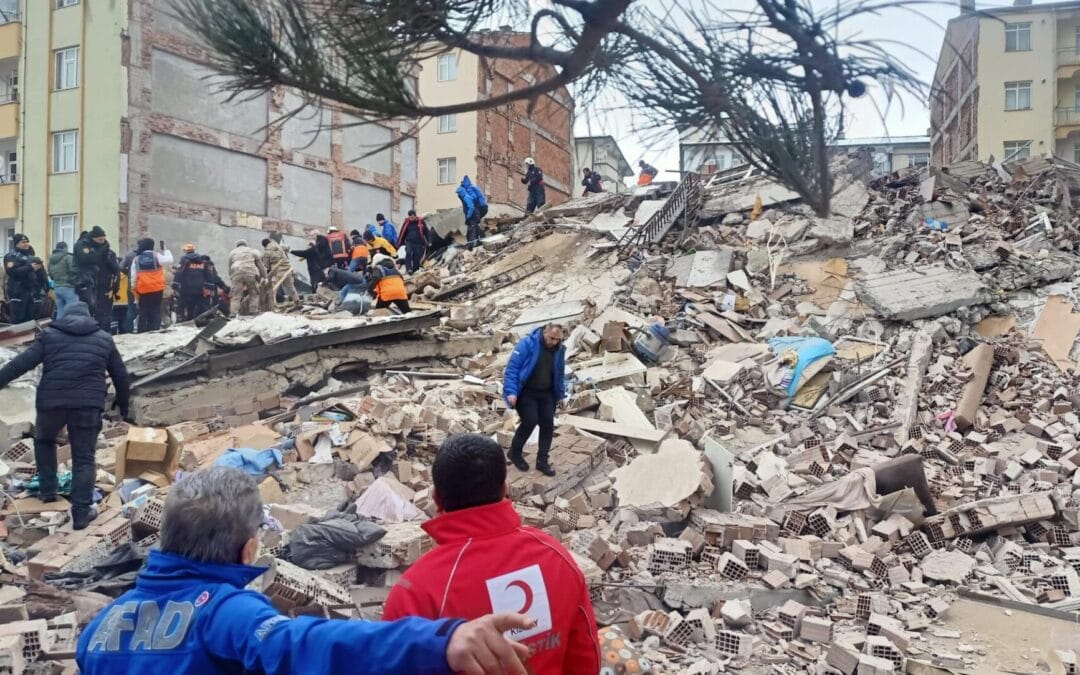
Feb 7, 2023 | Centro internazionale, Non categorizzato, Sociale
The donations, collected through the NGOs Azione per un Mondo Unito (AMU) and Azione per Famiglie Nuove (AFN), will be used to provide with basic necessities the people of Turkey and Syria affected by the strong earthquake on 6 February 2023, also in collaboration with the local Churches.
The Emergency Coordination of the Focolare Movement has launched an extraordinary fundraising campaign in support of the people of Turkey and Syria, through the non-profit organisations Action for a United World (AMU) and Action for New Families (AFN). The donations will be jointly managed by AMU and AFN to bring basic necessities for food, medical care, housing, heating and shelter to the people affected by the earthquake of the 6th February 2023 in various cities in the two countries, also in cooperation with local churches. You can donate online at: AMU: www.amu-it.eu/dona-online-3/ AFN: www.afnonlus.org/dona/
or by bank transfer to the following accounts:
Action for a United World ONLUS (AMU) IBAN: IT 58 S 05018 03200 000011204344 at Banca Popolare Etica Codice SWIFT/BIC: ETICIT22XXX
Action for New Families ONLUS (AFN) IBAN: IT 92 J 05018 03200 000016978561 at Banca Popolare Etica Codice SWIFT/BIC: ETICIT22XXX
Reason for payment: Middle East Earthquake Emergency T
ax benefits are available for such donations in many EU countries and in other countries around the world, according to different local regulations. Italian taxpayers will be able to obtain deductions and deductions from their income, according to the regulations for non-profit organisations
Feb 6, 2023 | Non categorizzato
The Resurrection of Rome is one of Chiara Lubich’s most famous writings and was the fruit of an experience she then related in an article in ‘La Via’ magazine in 1949. The text shows both the mystical dimension of a charismatic experience, expressed in language that is particularly rich in images, and the practical application of this experience in contact with humanity. The text marks a turning point in Chiara Lubich’s experience in 1949: her return to Rome, and therefore to normal life, which was lived as bringing light and life into daily routine and bearing fruit in a renewal not only of one’s personal existence but of society. For the author, the way of looking at Rome means, in fact, a way of looking at all the cities of the world. The video we present is the result of long and patient work by Javier Garcia, with the original voice of Chiara Lubich taken from the reading of the text addressed to the Focolare leadership on 3rd October 1995. Activate English subtitles https://www.youtube.com/watch?v=acrJDXY6Lig
Feb 3, 2023 | Non categorizzato
Being a community is more than just being together.It means responding to a call to build: giving life to a family sustained by the Word and meeting each other. Here, in this video, is what some people who participated in the Mariapolis of the Holy Land last July told us. There is a light breeze which caresses the ancient ruins of the Church of St. George, in Taybeh, the only entirely Christian village in the Holy Land. According to Scripture, it is the place where Jesus came to rest with his followers before the Passion. And it was here, on 8th-9th July 2022 that adults, young people and children of the Focolare Movement gathered together to live a truly special Mariapolis, a moment of fraternity and true communion. “Mariapolis is a time for the family to get together,” says Mayra, from Bethlehem, “It usually takes place every year but due to the pandemic we couldn’t have it. This year, after three years, we could and for me it’s like taking a break from my life and recharging myself spiritually.” “To be witnesses of love” was the title of this two-day event that saw the participation of people from many regions of the country, from Haifa, Nazareth, to Jerusalem, Ramallah, Bethlehem and Gaza. Despite the socio-political and cultural challenges of the Holy Land, the desire to enjoy beauty and to live as a community give the strength to overcome physical and often inner barriers. The community is the place where we find the values that become nourishment, where we build a present and a future which respect the dignity of all; the place where listening to and witnessing to the other in the light of the Gospel invites us to better understand the work of God in our lives and, more than anything else, it is the place where no one is alone. Marcell and Boulos, from Nazareth shared this with us: in their life-journey, they were able to experience support and family during the most painful moment of their lives, the death of their youngest son, Jack. And Khader, from Gaza, who despite the daily hardships to be faced in the context in which he lives, places his hope in God, joyfully recognizing the beauty of the vocation to which he is called: that of happiness.
Maria Grazia Berretta
Activate English subtitles https://youtu.be/cCMZ1jlYzhA
Jan 26, 2023 | Non categorizzato
One of the greatest sufferings for human beings is to feel worthless when faced with the realities of life, to accept that at times we cannot do anything. To be an instrument in God’s hands means to make ourselves available, rediscover our own value in letting someone else do something, and learn the art of entrusting ourselves to others. A bit of prudence As head of a department in my company, one day I noticed that my typically peaceful colleague had an aggressive attitude. When I invited him to talk, he confided in me his problems with his wife, who had turned out to be violent to the point of laying hands on him. She continually demanded more and more money from him. This was what was behind his working overtime. Since then, my colleague started phoning me outside work when things were going badly, certain that he would find a listening ear. However, when I realised that I had become a kind of safe haven for him, I felt the need to talk to my husband about it, out of Christian prudence. After helping me to understand that for that man I might not just be a friend, but the ideal of a woman, my husband put forth an idea that turned out to be a winner. We invited over the colleague’s family using the excuse of a birthday. After trusting in God, and thanks to the atmosphere created by our children’s games and prizes, the relationship established with the other couple gave hope for a change in their situation. (G.T., Portugal) Goodbye bicycle For some time now I have had to put my beloved bicycle, my companion on so many journeys, to rest in the garage. The fact is that, because of my bifocals, I am now forced to walk. To be honest, it has cost me a bit personally. The bike was very useful, because I could put my shopping and other things in the basket, which I now have to carry by hand. Luckily I live in a small town where everything I need is close by. That said, I have discovered an advantage of going without two wheels, beyond that of avoiding falls, which are so disastrous when one has reached a certain age. Walking gives me the opportunity to meet many people, have a chat… and there is always something sad or joyful to share. In short, everything is an expression of God’s love, if we are willing to do his will. Better to try to go to heaven without a bicycle than to go faster… and where then? (Marianna, Italy)
Edited by Maria Grazia Berretta.
From “Il Vangelo del Giorno”, Città Nuova, year IX, no.1, January–February 2023



 These are the words of Gintaras Grušas, Archbishop of Vilnius (Lithuania), President of the Council of European Episcopal Conferences (CCEE), in his opening speech at the European Synodal Continental Assembly. Solidarity with the Turkish and Syrian populations affected by the terrible earthquake was also expressed immediately. The meeting is taking place in the capital of the Czech Republic, from 5th-12th February, with the participation of 200 delegates from the 39 European Episcopal Conferences, from 45 countries. There were also 44 “guests” including Margaret Karram, President of the Focolare Movement. Cardinal Mario Grech, Secretary General of the Synod, offered a realistic perspective of this phase of the journey saying, “We are all learners in synodality.” The Church in Europe met to experience a journey of sharing, more necessary than ever today, to get to know each other and to break down prejudices.
These are the words of Gintaras Grušas, Archbishop of Vilnius (Lithuania), President of the Council of European Episcopal Conferences (CCEE), in his opening speech at the European Synodal Continental Assembly. Solidarity with the Turkish and Syrian populations affected by the terrible earthquake was also expressed immediately. The meeting is taking place in the capital of the Czech Republic, from 5th-12th February, with the participation of 200 delegates from the 39 European Episcopal Conferences, from 45 countries. There were also 44 “guests” including Margaret Karram, President of the Focolare Movement. Cardinal Mario Grech, Secretary General of the Synod, offered a realistic perspective of this phase of the journey saying, “We are all learners in synodality.” The Church in Europe met to experience a journey of sharing, more necessary than ever today, to get to know each other and to break down prejudices.  The Voice of the Churches in Europe The sessions dedicated to the experience of the synodal journey of the various Episcopal conferences gave a glimpse into the life of the Churches in Europe. From Albania where today Christians are confronted with the need to learn to dialogue with people of different religions to Belgium, where secularization has reached every social sphere. The invitation is to know how to grasp the signs of the times, giving space to the laity, avoiding every form of clericalism, every yielding to attitudes of abuse and power. In Belarus, the synodal journey brought to light the need for formation in dialogue for both the clergy and the laity in order to have a greater impact on society. Bulgaria, a country with a very small percentage of Catholics, told of a synodal path animated by a strong ecumenical spirit. This was shared by several countries of Eastern Europe, while from France came a resolute invitation to listen, to the centrality of the victims of abuse in the Church and to a path of purification in spiritual life to rediscover fidelity to Christ and to be a welcoming Church for all. The Churches of Great Britain and Wales emphasized the need for ongoing formation in the life of faith and evangelization. Transversal issues
The Voice of the Churches in Europe The sessions dedicated to the experience of the synodal journey of the various Episcopal conferences gave a glimpse into the life of the Churches in Europe. From Albania where today Christians are confronted with the need to learn to dialogue with people of different religions to Belgium, where secularization has reached every social sphere. The invitation is to know how to grasp the signs of the times, giving space to the laity, avoiding every form of clericalism, every yielding to attitudes of abuse and power. In Belarus, the synodal journey brought to light the need for formation in dialogue for both the clergy and the laity in order to have a greater impact on society. Bulgaria, a country with a very small percentage of Catholics, told of a synodal path animated by a strong ecumenical spirit. This was shared by several countries of Eastern Europe, while from France came a resolute invitation to listen, to the centrality of the victims of abuse in the Church and to a path of purification in spiritual life to rediscover fidelity to Christ and to be a welcoming Church for all. The Churches of Great Britain and Wales emphasized the need for ongoing formation in the life of faith and evangelization. Transversal issues 
 In the catastrophe of the ruins and the cold, suffering brings people together to respond. Umberta heard about the collapse of the Basilica of the Annunciation in Iskenderum and how many houses of the Archdiocese have been declared uninhabitable. Catholics, Orthodox, and Muslims came together to share what they have and to offer accommodation. She said, “It is incredible to see the thousands of young people who have crowded into the airport, ready to go to help with the rescue. There is an endless queue of people to donate blood and secondary school students are getting involved in many projects of assistance. We continue to trust in God and in his Providence and to remember our beloved Syria.” Bassel, a young member of the Focolare in Syria sent us this account, “These are devastating days also in my city, Aleppo. On 6th February we woke up terrified and ran towards the stairs, we couldn’t see anything, due to the power failure. We stopped at the front door, where there is an image of the Guardian Angel and said a prayer. Then we found a mobile phone and switched on the light. I didn’t recognize the room: everything on the floor was broken, the walls and tiles were cracked, the neighbours coming down the stairs screaming. We took only what we could carry in our pyjama pockets, put on our coats and went out in the rain and freezing cold.”
In the catastrophe of the ruins and the cold, suffering brings people together to respond. Umberta heard about the collapse of the Basilica of the Annunciation in Iskenderum and how many houses of the Archdiocese have been declared uninhabitable. Catholics, Orthodox, and Muslims came together to share what they have and to offer accommodation. She said, “It is incredible to see the thousands of young people who have crowded into the airport, ready to go to help with the rescue. There is an endless queue of people to donate blood and secondary school students are getting involved in many projects of assistance. We continue to trust in God and in his Providence and to remember our beloved Syria.” Bassel, a young member of the Focolare in Syria sent us this account, “These are devastating days also in my city, Aleppo. On 6th February we woke up terrified and ran towards the stairs, we couldn’t see anything, due to the power failure. We stopped at the front door, where there is an image of the Guardian Angel and said a prayer. Then we found a mobile phone and switched on the light. I didn’t recognize the room: everything on the floor was broken, the walls and tiles were cracked, the neighbours coming down the stairs screaming. We took only what we could carry in our pyjama pockets, put on our coats and went out in the rain and freezing cold.” 
